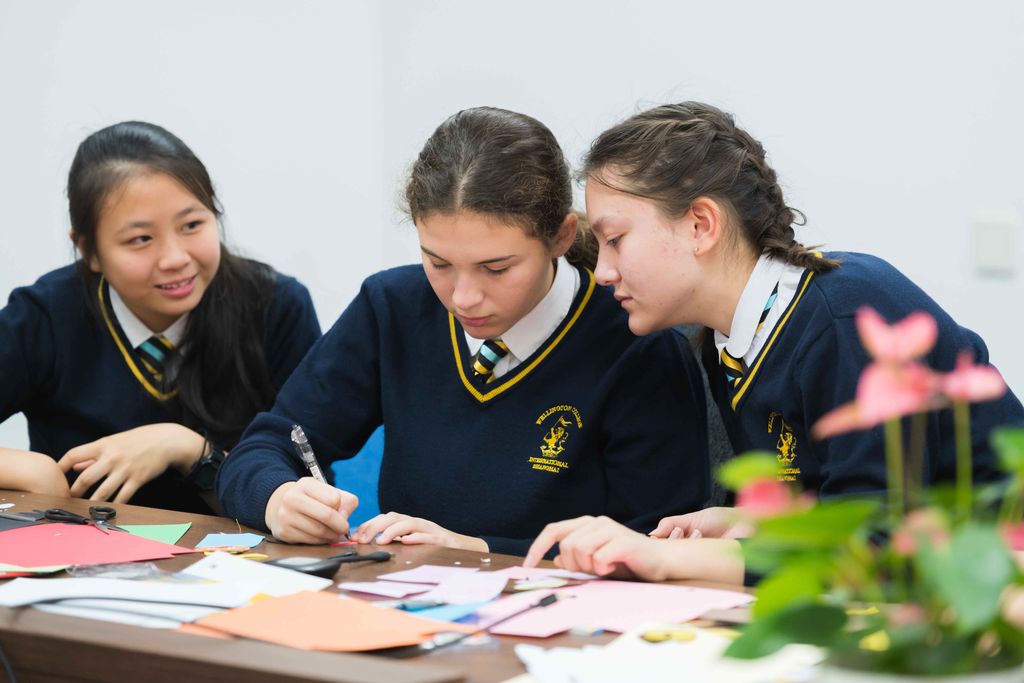Hobbies are more than just a way to pass the time—they’re a gateway to personal growth, creativity, and well-being for children. At Lakshya International School, a leading CBSE-affiliated institution in Kakinada, Andhra Pradesh, hobbies are woven into the fabric of holistic education. The school recognizes that encouraging children to pursue their passions outside the classroom fosters skills that shape them into confident, well-rounded individuals. This article explores why hobbies matter, how Lakshya International School integrates them into its curriculum, and practical ways parents can nurture their child’s interests.
Why Hobbies Matter for Child Development
Hobbies provide children with a unique opportunity to explore their interests, develop skills, and build resilience. They’re like little windows into a child’s personality, revealing what excites them and where their strengths lie. At Lakshya International School, hobbies are seen as essential tools for cognitive, emotional, and social growth, complementing academic learning with real-world skills.
Cognitive Benefits of Hobbies
Engaging in hobbies like chess, reading, or painting stimulates a child’s brain, enhancing critical thinking and problem-solving skills. For instance, a child who loves solving puzzles sharpens their analytical abilities, which can translate to better performance in math or science. Lakshya encourages such activities through dedicated clubs, ensuring students exercise their minds in fun, meaningful ways.
Emotional Growth Through Creative Outlets
Hobbies offer a safe space for children to express emotions and relieve stress. Whether it’s strumming a guitar or sketching a sunset, creative pursuits help kids process feelings and build self-esteem. At Lakshya, students are encouraged to join music or art clubs, where they can channel their emotions into something beautiful and rewarding.
Social Skills and Teamwork
Group hobbies like team sports or drama clubs teach children the value of collaboration and communication. Imagine a shy kid stepping onto the soccer field at Lakshya’s sprawling playground, gradually learning to cheer for teammates and strategize together. These experiences build leadership and empathy, skills that last a lifetime.
How Lakshya International School Integrates Hobbies
Lakshya International School, one of the top CBSE schools in Kakinada, goes beyond traditional academics by embedding hobbies into its curriculum. The school’s philosophy is rooted in holistic development, ensuring students grow intellectually, emotionally, and socially through their passions. From sports to music to robotics, Lakshya offers a diverse range of activities tailored to every child’s interests.
Extracurricular Programs at Lakshya
Lakshya’s extracurricular offerings are designed to spark creativity and curiosity. The school provides access to well-equipped labs, art studios, and sports facilities, creating an environment where hobbies thrive. Students can choose from clubs like robotics, dance, or literary societies, each guided by experienced faculty who nurture their talents.
The Role of Playgrounds and Sports
Physical hobbies are a cornerstone of Lakshya’s curriculum. The school’s vast playground hosts sports like cricket, basketball, and badminton, promoting physical health and teamwork. A student who joins the cricket team not only builds stamina but also learns to handle pressure and celebrate collective victories.
Creative Clubs for Self-Expression
For students inclined toward the arts, Lakshya offers music, dance, and painting clubs. These activities encourage self-expression and boost confidence. Picture a young girl nervously performing her first Kathak dance at a school event, only to receive applause that lights up her confidence—this is the magic of hobbies at Lakshya.
Educational Field Trips and Real-World Learning
Lakshya takes hobbies beyond the classroom with educational field trips. These outings allow students to explore their interests in real-world settings, whether it’s a visit to a science museum for budding engineers or a nature trip for aspiring environmentalists. Such experiences make learning tangible and exciting.
The Benefits of Hobbies: A Deeper Dive
Hobbies do more than keep kids busy—they shape their character and prepare them for the future. Here’s a closer look at how hobbies contribute to a child’s growth, backed by real-world examples and insights from Lakshya’s approach.
Building Confidence and Self-Esteem
When children master a skill, like playing a musical instrument or winning a chess match, they feel a sense of accomplishment. At Lakshya, a student who struggled with public speaking joined the drama club and, over time, became the star of the school play. This boost in confidence spilled over into her academics, proving hobbies can transform self-perception.
Fostering Discipline and Perseverance
Hobbies like learning the violin or collecting rare coins require patience and practice. Lakshya’s music classes, for instance, teach students that progress comes with consistent effort. A boy who spent months perfecting a piano piece learned not just music but the value of hard work—a lesson that applies to life.
Enhancing Creativity and Problem-Solving
Creative hobbies spark imagination, helping kids think outside the box. Lakshya’s art and writing clubs encourage students to create stories or paint their visions, fostering innovative thinking. A student who wrote a short story for the school magazine discovered her knack for storytelling, opening doors to future creative pursuits.
Reducing Stress and Promoting Mental Health
In today’s fast-paced world, children face academic and social pressures. Hobbies provide a healthy escape. Lakshya’s yoga and meditation sessions, for example, help students manage stress while fostering mindfulness. A parent once shared how their son, overwhelmed by exams, found solace in gardening, a hobby nurtured through the school’s eco-club.
Comparison: Hobbies vs. Screen Time
| Aspect | Hobbies | Screen Time |
|---|---|---|
| Cognitive Impact | Enhances critical thinking and creativity | Can lead to reduced attention span |
| Emotional Benefits | Boosts self-esteem and stress relief | May increase anxiety or isolation |
| Social Skills | Encourages teamwork and communication | Often solitary, limiting interaction |
| Physical Health | Promotes activity (e.g., sports, dance) | Sedentary, may harm posture or eyesight |
Pros and Cons of Encouraging Hobbies
Pros:
- Develops diverse skills (cognitive, social, emotional)
- Boosts confidence and self-worth
- Provides a healthy outlet for stress
- Encourages lifelong learning and curiosity
Cons:
- Time management challenges if not balanced with academics
- Potential costs for equipment or classes (e.g., musical instruments)
- Risk of overcommitment, leading to burnout
People Also Ask (PAA)
Here are answers to common questions about hobbies for children, inspired by Google’s PAA section:
Why are hobbies important for kids?
Hobbies help children develop critical life skills like creativity, discipline, and teamwork. They provide a break from academics, reduce stress, and boost confidence. At Lakshya International School, hobbies are integrated into the curriculum to ensure holistic growth.
What are the best hobbies for children?
The best hobbies depend on a child’s interests but include activities like sports, music, art, reading, or coding. Lakshya offers diverse clubs, from robotics to dance, allowing kids to explore passions in a supportive environment.
How can parents encourage hobbies?
Parents can encourage hobbies by observing their child’s interests, providing resources, and enrolling them in relevant classes or clubs. Lakshya’s extracurricular programs make it easy for parents to find activities that suit their child’s talents.
How do hobbies affect academic performance?
Hobbies can improve focus, discipline, and time management, positively impacting academics. For example, a Lakshya student who joined the chess club improved her math scores due to enhanced problem-solving skills.
Practical Tips for Parents: Nurturing Hobbies at Home
Parents play a crucial role in fostering their child’s hobbies. Here are actionable ways to support your child’s passions, inspired by Lakshya’s approach:
- Observe and Listen: Pay attention to what excites your child. If they love drawing, provide sketchbooks or enroll them in Lakshya’s art club.
- Set a Routine: Help your child balance hobbies with schoolwork by creating a schedule. Lakshya’s structured extracurricular programs can serve as a model.
- Celebrate Small Wins: Praise your child’s progress, whether it’s a new dance move or a completed puzzle. This mirrors Lakshya’s emphasis on recognizing effort.
- Explore Local Resources: Look for community centers or workshops in Kakinada that align with your child’s interests. Lakshya’s field trips can inspire ideas for local outings.
- Be Patient: Hobbies take time to develop. Encourage persistence, as Lakshya does through its long-term club activities.
Where to Find Hobby Resources in Kakinada
For parents in Kakinada, Lakshya International School is a one-stop destination for nurturing hobbies. The school’s state-of-the-art facilities, including science labs, sports fields, and art studios, provide a nurturing environment for exploration. Beyond Lakshya, parents can explore local options like:
- Kakinada Public Library: Ideal for budding readers or writers.
- Local Sports Academies: Offer training in cricket, badminton, and more.
- Art and Music Schools: Provide lessons in painting, dance, or instruments.
For specific programs, visit Lakshya International School’s official website or contact their admissions team at lakshyaintschool@gmail.com.
Best Tools for Developing Hobbies
To support your child’s hobbies, consider these tools and resources:
- Art Supplies: Brands like Faber-Castell offer kid-friendly sketch kits for drawing and painting.
- Musical Instruments: Yamaha or Casio provide affordable beginner keyboards or guitars.
- Sports Gear: Local stores in Kakinada stock quality equipment for cricket or soccer.
- Online Platforms: Websites like Khan Academy or Code.org offer free coding lessons for tech-savvy kids.
- Books: Visit Amazon.in for age-appropriate books on hobbies like chess or gardening.
FAQ Section
How do hobbies benefit a child’s future?
Hobbies build transferable skills like teamwork, creativity, and perseverance, which are essential for academic and career success. Lakshya’s holistic approach ensures students develop these qualities alongside their passions.
Can hobbies improve academic performance?
Yes, hobbies like chess or reading can enhance focus and problem-solving, indirectly boosting grades. Lakshya’s students often see academic improvements after joining hobby-based clubs.
How does Lakshya International School support hobbies?
Lakshya offers a range of extracurricular activities, from sports to arts, supported by modern facilities and expert faculty. These programs help students explore and excel in their interests.
What if my child doesn’t have a hobby?
Parents can expose their child to various activities through trial classes or school clubs. Lakshya’s diverse offerings make it easy for kids to discover passions they didn’t know they had.
Are hobbies expensive to maintain?
Some hobbies, like sports or music, may require investment, but many, like reading or drawing, are low-cost. Lakshya provides access to facilities, reducing the financial burden for parents.
Conclusion: Hobbies as a Path to Growth
Hobbies are more than just fun—they’re a vital part of a child’s development, fostering skills that shape their future. At Lakshya International School, hobbies are celebrated as tools for building confidence, creativity, and character. By integrating activities like sports, arts, and educational trips into its curriculum, Lakshya ensures students grow into well-rounded individuals ready to tackle life’s challenges. Parents can support this journey by encouraging exploration, celebrating progress, and leveraging resources like Lakshya’s programs. So, whether your child dreams of scoring goals or painting masterpieces, a hobby nurtured today can spark a lifetime of success.



